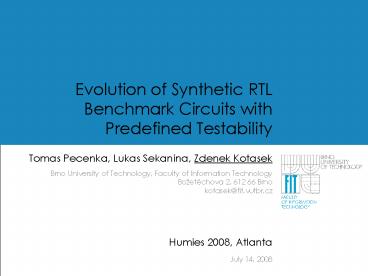Sn PowerPoint PPT Presentation
Title: Sn
1
Evolution of Synthetic RTL Benchmark Circuits
with Predefined Testability
Tomas Pecenka, Lukas Sekanina, Zdenek Kotasek
Brno University of Technology, Faculty of
Information Technology Božetechova 2, 612 66
Brno kotasek_at_fit.vutbr.cz July 14, 2008
Humies 2008, Atlanta
2
Our entry
- a set of benchmark digital circuits designed
using an EA - These benchmark circuits
- are intended for validation of CAD tools used in
the area of digital circuits testing, - have a predefined structure and level of
testability, - are the most complex benchmark circuits with an
optional level of testability. - Publication
- Pecenka, T., Sekanina, L., Kotasek, Z. Evolution
of Synthetic RTL Benchmark Circuits with
Predefined Testability. ACM Transactions on
Design Automation of Electronic Systems (TODAES).
Vol 13, No 3, 2008, 21 pages
3
Overview
CAD tools for optimization of area, timing,
power consumption,
A circuit under design
CAD tool for testability analysis
Is the tool correct? The tool is validated using
a set of benchmark circuits. The benchmarks
should reveal weak points of used testability
analysis (TA) algorithms.
Circuit modification in order to improve the
testability
level of testability
4
Existing Benchmark Circuits
- Real-world circuits
- ISCAS85, ISCAS89, ITC99, ITC02
- max. 231,320 gates and 6,642 FFs
- Synthetic sets
- mainly composed of above-mentioned circuits
- see references in TODAES paper
- Main problem
- The benchmark sets used till now do not provide
circuits with various levels of
testability/complexity, which is important for
consistent validation of testability analysis
methods. - Our benchmarks the starting testability
parameters are known gt it can be derived how the
particular methodology improved testability and
what is the size of the additional hardware.
5
Proposed benchmark circuits
- EA is used to design benchmark circuits according
to user specification - Input type of components, the number of I/O,
testability requirements, etc. - Output RTL circuit with required complexity and
testability - Benchmark set
- 24 circuits from 2k gates to 1,2 M gates (after
synthesis), four levels of testability 0, 33,
66, 100 - 11 circuits 108k gates, 11 levels of testability
- In our methodology, evolutionary circuit design
at the functional level is used (thousands of
components in a circuit) - In the fitness function, the testability is
calculated (quadratic time complexity). - Testability of evolved circuits is validated
using a commercial CAD tool.
6
What we claim
- D The proposed method was accepted as a new
solution for design of synthetic benchmark
circuits by one of prominent journals (ACM
TODAES) in the field of design and test of
digital circuits. Proposed set of benchmarks was
accepted independently of the fact that it was
mechanically created. - G Engineers have proposed various benchmark
circuits in the area of digital circuits testing
for many years. The main problem in their design
is the need for simultaneous high complexity and
controlled testability. Hence, the problem is
seen as of indisputable difficulty in its field.
The proposed method is able to provide the most
complex circuits with a known level of
testability.
7
Why we should win Humies 2008 (1)
- A new concept was proposed for validation of
testability analysis methods. - Instead of the use of somehow created benchmark
sets, we can generate a well-targeted set of
benchmark circuits which can systematically
validate crucial features of TA methods. - optional complexity of benchmark circuits
- optional testability of benchmark circuits
- Important We did not improve an existing
solution only, we proposed a completely new
concept.
8
Why we should win Humies 2008 (2)
- The result was accepted as an innovation outside
the EA community, independently of the fact that
it was created by EA. - In the field of digital circuits testing, an
extremely high competition can be observed (more
than 50 years of development). - Many well-performing approaches have been
proposed for this particular problem. - The community is really conservative and
pragmatic with respect to completely new
approaches and methodologies. - Have you attended a hardware-oriented conference?
Many people do wear a tie there. Why? - Important We have not presented our solution
only to the EA community! - Pecenka, T., Sekanina, L., Kotasek, Z. Evolution
of Synthetic RTL Benchmark Circuits with
Predefined Testability. ACM Transactions on
Design Automation of Electronic Systems. Vol 13,
No 3, 2008, 21 pages
9
Why we should win Humies 2008 (3)
- The result strongly benefits from the use of the
evolutionary approach. - As benchmark circuits are designed by means of
the EA, they can contain constructions which do
not usually appear in the circuits designed by
classical design techniques. - Thus, the use of evolved benchmark circuits in
the process of evaluating new TA tools can reveal
problems that remain hidden when conventional
benchmark circuits are used. - A story with one of commercial ATPG tools
- Important We have really exploited the power of
evolutionary design!
10
Why we should win Humies 2008 (4)
- We evolved the largest objects (i.e. circuits
containing more than 1.2M gates after synthesis)
that have probably been created by an EA ever. - A promising application area was identified for
evolvable hardware Instead of function,
structural properties of circuits can be sought
by an EA! - Important We have an interesting contribution
into the evolvable hardware field.
11
Why we should win Humies 2008 (5)
- In what ways does this paper advance the field?
- the issue of making available benchmark
circuits with the complexity compatible to
state-of-the-art digital designs is relevant - To my knowledge, an original contribution to the
area of the automated design of benchmark
circuits for evaluation of Design-For-Testability
methods. - Anonymous reviewer
12
Thank you for your attention!

